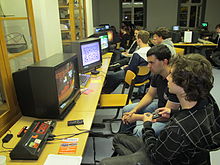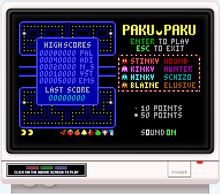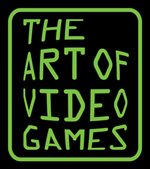Retrogaming

As Retrogaming playing and collecting is older computer called and video games. The period of upheaval towards the predominant release of 3D games in the mid-1990s is often seen as the limit heralded by more powerful graphics chips in PCs and consoles, especially the PlayStation . However, following the principle of retro , this limit is shifting; games up until the end of the 1990s are often viewed as "retro". They are part of retrocomputing .
Further, the term has also established itself as a genre designation and designated as such computer games until the end of the 8-bit era (about 1970 to about 1985), such as Pong or Frogger that are not clearly in one of the most commonly used today genres lane and are therefore only classified as "retro".
The preoccupation of individuals or groups with classic video and computer games is a phenomenon that can be differentiated from normal mainstream gaming culture.
history
The trend of retrogaming emerged at the end of the 1990s and has enjoyed increasing popularity ever since, which focuses on old games and game consoles. This is definitely a current development in the computer game scene, e.g. For example, there are now specialized publications such as the monthly RetroGamer Magazine or the German-language Retro and Return magazines .
- Games industry reactions
Since the 2000s, the games industry has also discovered the target group of “retrogamers” and the existing stock of “retrogames” for itself. Remarkably, more and more classic games are being released on current consoles in the form of samplers . An example of this is the Konami Arcade Classics collection for the Nintendo DS or the SEGA Mega Drive Ultimate Collection for the Xbox 360 or Playstation 3. With these compilations, more than 10 or 20 old games are usually brought to the customer in one package . Another sales market for classic video games is the Xbox Live marketplace, where HD versions of classics such as Street Fighter can be purchased, as well as the Nintendo Wii shop channel . Nintendo also released the Nintendo Classic Mini console on November 11, 2016. The console is a technically improved new edition of the Nintendo Entertainment System with 30 pre-installed NES classics.
The Polish company GOG.com , the abbreviation is originally derived from "Good Old Games" , has been offering PC classics from the DOS and early Windows era since 2008, technically prepared for modern platforms via digital distribution on.
motivation
In general, two main reasons for this trend can be identified.
On the one hand, many of today's adult computer gamers grew up with the beginnings of computer game development in the late 1980s and early 1990s, for whom the games of the time were very formative. Many games genres are now almost extinct, including but not Adventures , Jump 'n' Runs , puzzles and side-scroller , because the gaming industry sees no market potential for this species. Due to the lack of current alternatives and out of nostalgia, the focus is again on the old classics.
The second reason is that many players accuse today's game industry of acting too conservatively and commercially and of not giving or being able to give creative game concepts a chance - a point of view that is partly shared by developer companies and publishers themselves. Since the 1990s, the cost of professional game development has risen significantly and the fear of producing a costly failure has increased, which has resulted in a focus on well-known game recipes, continuations of successful titles without new creative concepts and the simpler, but broader target groups appealing casual games .
aims
The main motives for retrogaming are to preserve classic games and make them accessible to a broader public. It should also mean that classics such as B. happened when Atari Sunnyvale was closed in 1996. At that time u. a. the original source code of milestones in computer game history such as Asteroids or Centipede is disposed of. Fortunately, a part was rescued from the garbage by enthusiasts, reconstructed and later published via the Atari Museum.
Therefore, the goal and interest of the retrogaming movement is that old games are published as freeware or open source software in good time. This also removes them from the legal gray area of abandonware and the necessary technical adjustments can be effectively made with the source text.
Another goal is to make old games run on modern operating systems and hardware platforms again, e.g. B. by so-called community patches , which try to fix these deficiencies. The ability to run on current platforms can also be achieved by developing alternative interpreters (e.g. ScummVM ) and emulators (e.g. DOSBox or MAME ). In addition, numerous games that have never been localized for the German market are translated from Japanese or English into German (so-called fan translations) and thus made available.
Another form of retrogaming is the making available as remakes or porting (with the source code) of old games for new hardware and software platforms, e.g. B. portable devices or cell phones, or Mac OS . The background here is that games of the 8 or 16-bit era were developed on hardware with comparable computing power and technical key data (RAM, screen resolution) as cell phones today. This makes porting easy, and the profile of the games corresponds to that for the target platform (e.g. readability despite low screen resolution ).
A new trend is the revival of old computer game titles as part of crowdfunding . For example, Wasteland 2 was successfully funded with $ 3 million in 2012 as a Wasteland- inspired turn-based , post-apocalyptic old-school computer role-playing game from Brian Fargo's InXile Entertainment on the Kickstarter.com platform.
Museums and exhibitions
Classic video games are now recognized by museums around the world as an art form and presented in exhibitions. B. in Karlsruhe in the RetroGames Arcade Museum, which was founded in 2002, or the computer games museum in Berlin , which opened in 1997 .
As a traveling exhibition at trade fairs, congresses and festivals, the House of Computer Games shows changing exhibits on the history and culture of computer games. It organizes the two largest retro gaming events in Germany, the special retro show at Gamescom in Cologne and the Long Night of Computer Games in Leipzig.
Exhibitions of classic video games also exist in traditional art museums, such as the exhibition The Art of Video Games 2012 at the Smithsonian American Art Museum or as part of the "Applied Design" permanent exhibition at the Museum of Modern Art since 2013. Classic video games are also the subject of the Vintage computer festivals .
Projects
interpreter
- Z-machine - all Infocom - Adventure
- ScummVM - LucasArts -Adventures, AGI based Sierra -Adventure (formerly Sarien), u. a.
- Exult - Ultima 7 Engine Rewrite
Emulators
See also
- List of commercial computer games with published source code
- Genre (computer games)
- History of video games
- Golden era of arcade games
- Virtual Console
literature
- Sebastian Felzmann: Playing Yesterday - media nostalgia in computer games, ISBN 978-3-86488-015-5
- Sebastian Felzmann: Playing Yesterday - media nostalgia and video games. In: Karlsruhe Studies on Technology and Culture, Volume 2: Technology nostalgia and retro technology , ed. by Andreas Böhn and Kurt Möser, ISBN 978-3-86644-474-4
- Sebastian Felzmann: Playing Yesterday - Retrogaming and Media Nostalgia (FROG Talk) Lecture, held as part of the 4th Future and Reality of Gaming (FROG) in Vienna 2010. [2]
- Ann-Marie Letourneur, Michael Mosel, Tim Raupach (eds.): Retro-Games and Retro-Gaming. Nostalgia as a phenomenon of a performative aesthetic of computer and video game cultures, ISBN 978-3-86488-078-0
- Konrad Lischka: Playground Computer. Culture, History and Aesthetics of Computer Games, ISBN 3-88229-193-1
- Mathias Mertens, Tobias O. Meissner : We were Space Invaders, ISBN 3-8218-3920-1
Web links
- Periodicals on the subject
- Lotek64 free magazine for older game consoles and home computers
- LOAD-Magazin free magazine about home computers and classic game consoles
- RETRO-Magazin German-language magazine on the subject of retro and video game culture
- RETURN Magazin German-language magazine about 8-bit computers and game consoles
- Retro Gamer English language monthly magazine on the subject
- Retro Gamer German edition based on the English-language magazine (with Germany-specific content)
- Web pages
- 8-Bit-Nirvana Homepage for 8-bit computers and video games
- retrobase.net database of classic video games
- Online Retrogames Information, online games and "Retrogames" for download
- Vogons Very old games on new systems active community for games from the DOS and early Windows era
- Retropoly.de Community all about classic computer and video games. Many magazines are available in the joker archive.
- Jason Scott: Apple II Library: The 4am Collection. Internet Archive, 2016, accessed February 17, 2016 (Collection of emulations of Apple II games).
- Jason Scott: Internet Arcade. Internet Archive, 2016, accessed February 17, 2016 (Collection of emulations of arcade games).
- Jason Scott: Software Library: MS-DOS Games. Internet Archive, 2016, accessed February 17, 2016 (Collection of emulations of MS-DOS games).
- Jason Scott: The Windows 3.x Showcase. Internet Archive , 2016, accessed February 17, 2016 (Collection of emulations of Windows 3.x programs and games).
- Reports and reports
- Retro games; Classic games report at 3sat.online from May 18, 2007
- Retro Games: In memories play report at www.spieletest.at (Christoph Puhl, February 4, 2008)
- www.pixelkitsch.de blog specializing in the aesthetic aspects of retrogaming
- www.pixelpommes.de Blog and podcast on retrogaming
Individual evidence
- ↑ MAGAZINE PROFILE ( English ) Imagine Publishing Ltd .. 2011. Archived from the original on August 15, 2011. Retrieved on July 29, 2011: “ Retro Gamer is the only gaming magazine in the UK that's totally dedicated to all aspects of retro gaming. If you're a fan of Jet Set Willy, or still feel that the Spectrum is the best games machine of all time then this is the magazine for you. "
- ↑ Retro
- ↑ Return: Magazine for the C64 generation ( Memento from July 9, 2012 in the Internet Archive ): Lovers of cultivated 8-bit culture will have a new magazine available from October: Return. The magazine appears quarterly and deals with all 8-bit computers and game consoles, their past and present.
- ↑ Frank Caron: First look: GOG revives classic PC games for download age ( English ) Ars Technica. September 9, 2008. Retrieved December 27, 2012: “ […] [Good Old Games] focuses on bringing old, time-tested games into the downloadable era with low prices and no DRM. "
- ↑ http://www.retromagazine.eu/retro/2015-06/die-zukunft-der-retro-videospiele/
- ↑ MARCELO PRINCE, PETER ROTH: Videogame Publishers Place Big Bets on Big-Budget Games ( English ) Wallstreet Journal Online. December 21, 2004. Retrieved July 1, 2013: " The jump in development and marketing costs has made the videogame industry" enormously risk averse, [...] Publishers have largely focused on making sequels to successful titles or games based on movie or comic book characters, which are seen as less risky. "We don't green light any more things that will be small or average size games. [...]" "
- ↑ John Walker: RPS Exclusive: Gabe Newell Interview ( English ) Rock, Paper, Shotgun. November 22, 2007. Retrieved on May 2, 2012: “ Don't take any risks, so I stayed strictly conservative with things that worked ”, German translation Interview with Gabe Newell
- ↑ Jason Knight: Paku Paku - A game for early PC / MS-DOS Computers ( English ) deathshadow.com. Retrieved October 18, 2013: " Contents of DEATHSHADOW'S MADNESS © Jason M. Knight unless otherwise noted All code presented on this site is released to the Public Domain. There'll be none of that open source licensing malarkey in here - If you going to give something away, LANDS SAKE JUST GIVE IT AWAY !!! "
- ↑ Kevin Parrish: Atari 7800 Source Code Rescued - Atari released the source code for the 7800 console and games ( English ) tomsguide.com. July 7, 2009. Retrieved January 9, 2012.
- ↑ 7800 Games & Development ( English ) atari-museum.com. 2009. Retrieved January 9, 2012: “ These games were rescued from Atari ST format diskettes that were thrown out behind 1196 Borregas when Atari closed up in 1996. The Atari Museum rescued these important treasures and recovered them from the diskettes. "
- ^ Andy Largent: Homeworld Source Code Released . www.insidemacgames.com. October 8, 2003. Retrieved January 10, 2011.
- ↑ Going Open Source! ( English ) soaos.sourceforge.net. June 23, 2003. Retrieved on August 2, 2011: “ In order to give the Siege game an extended practical life, allow ongoing player support, give the game a chance to be made available on other platforms, and to share our technical learning experience with the game development community, the Board of Directors at Digital Tome LP have agreed to release the Delphi source to the Siege game to the Open Source community under an LGPL license! "
- ^ John Szczepaniak: Japanese ROM Translation . In: Retro Gamer . 25, June 1, 2006, pp. 102-105. [1]
- ↑ tron: JA2-Stracciatella Q&A ( English ) ja-galaxy-forum.com. May 28, 2008. Archived from the original on October 13, 2010. Retrieved on January 28, 2012: “ What is the goal of JA2-Stracciatella? The goal is to make Jagged Alliance 2 available to a wide range of platforms, improve its stability, fix bugs [...] "
- ↑ JA2 Stracciatella Feedback → Jagged Alliance 2 Android Stracciatella Port RC2 Release - please test ( Memento from October 23, 2012 in the Internet Archive ) on the Bear's Pit Forum, October 3, 2011 (English)
- ↑ Players finance “Wasteland 2” , derStandard.at , March 19, 2012.
- ↑ RetroGames e. V.
- ^ Peter Schmitz: First registered association for computer and console game oldies opened . Heise.de . July 19, 2002. Retrieved June 1, 2012.
- ↑ Mike Snider: Are video games art? Draw your own conclusions . In: USA Today . Gannet . March 13, 2012. Retrieved June 2, 2012.
- ^ Paola Antonelli: Video Games: 14 in the Collection, for Starters . In: Inside / Out. A MoMA / MoMA PS1 Blog . Museum of Modern Art . November 29, 2012. Retrieved November 29, 2012.




